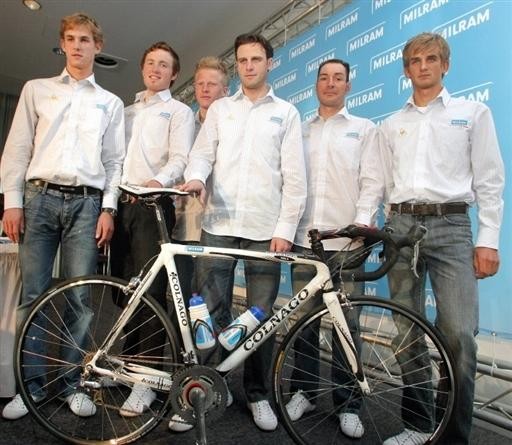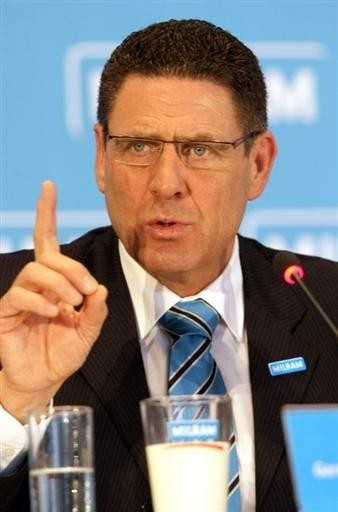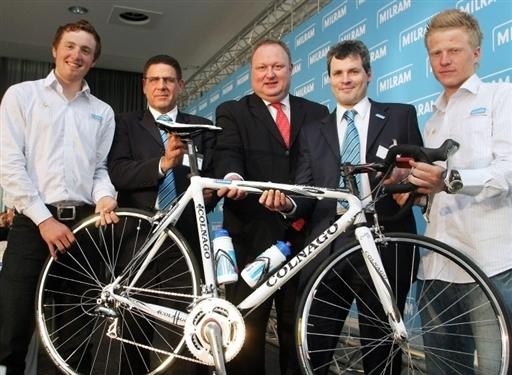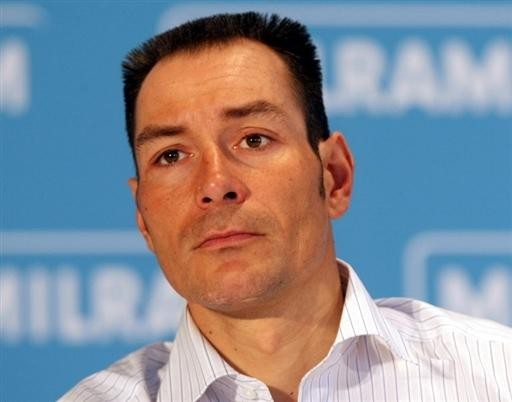Milram: Success through natural performance
The Milram team, like most of the cycling world, suffered under the weight of doping allegations,...




News Feature, January 11, 2008
As Team Milram shifts its nationality from Italian to German, the team's leaders naturally had to answer plenty of questions about its anti-doping program from the audience in Bremen, Germany at its team presentation on Thursday. Also hot topics were the shift in its country affiliation and the condition of its top sprinters, Erik Zabel and Alessandro Petacchi. Cyclingnews' Susan Westemeyer reports from the launch.
The Milram team, like most of the cycling world, suffered under the weight of doping allegations, confessions and suspicions in 2007, but with a change in team management, it hopes to assure its fans and sponsors that the team is "new" for 2008. In May last year, it's team captain Erik Zabel confessed to having used EPO in the 1990s. Then its other sprinter Alessandro Petacchi came up 'non-negative' for a too-high level of asthma medications in his urine during the Giro d'Italia, and fought off attempts by the Italian Olympic Committee (CONI) to sanction him.
More seriously, the team's general manager, Gianluigi Stanga had allegations leveled against him by German Jörg Jaksche, blaming Stanga for introducing him to doping on Team Polti in the 1990s. Stanga denied the charges, but the damage was done, and he had no choice but to step aside and be replaced by Dutch man Gerry Van Gerwen.
Martin Mischel, sales and marketing director of the team's title sponsor, Nordmilch AG, refused to blame Stanga, but indicated that the incident influenced the decision to move the team to Germany. "The things that were published last year concerning Stanga reflected on the team, which led to discussions. An agreement was reached between Gerry Van Gerwen and Stanga, to which we also agreed, to take over the team. The most important thing was to have the team based in Germany."
The team introduced the now practically obligatory anti-doping programme, which is based on five pillars: official rules; additional voluntary agreements; increased prevention; increased transparency; and clear consequences. "When a rider makes a mistake and is suspended for two years, that is not the end of it. Then comes the two-year ProTour ban, which makes a total of four years. He must pay back a year's salary. He has to answer to his wife and children - those are the consequences the riders must take into consideration," said General Manager Gerry Van Gerwen.
The practical consequences that the team can hand out are blunt: "An immediate suspension in case of a doping suspicion and an immediate dismissal in case of a confirmed doping case," Van Gerwen explained.
Get The Leadout Newsletter
The latest race content, interviews, features, reviews and expert buying guides, direct to your inbox!
To accomplish this, the team will work with the UCI, International Olympic Committee and the World Anti-Doping Agency, as well as the seven different national federations of its riders. These official institutions alone will carry out more than 600 doping controls on Team Milram this year. In addition, the team will join Team CSC and the Astana team in working with Dr. Rasmus Damsgaard, who will analyse and interpret eight blood samples per rider.
All of the team's members were required to sign medical and ethical statements as well as a team code of conduct.
In addition, the Milram team has set up its own software program to allow its riders to report their whereabouts over the internet until the UCI's ADAMS system is ready for use in March. The UCI, WADA, local NADAs and the national federations will also have access to the Milram system so that they will be able to locate the team's riders without difficulty.
Milram's German identity
Nordmilch's Mischel emphasized that as a German company, his organisation wanted to sponsor a German team, something which was accomplished by transferring the team's license from Italy to Germany. Van Gerwen is Dutch, but the ProTour license is German, and the team's new headquarters are now in Dortmund, Germany. "We made extensive changes, with the new German base, the clear focus on German riders, the younger squad, a scouting system for young talents and an enhanced anti-doping system," Van Gerwen said. "These changes make possible the establishment as a German team that stands for a maximum transparency towards all officials, media and fans."
Germany provides more riders to the squad than any other country. The team boasts 27 riders this year, with 12 Germans, seven Italians, three Slovaks, two Ukranians and one each from the Netherlands, Spain and Australia. Of the seven new riders, four are German. The newcomers have an average age of 22 and the biggest name is the Slovak Peter Velits, the U23 road World Champion, who together with his twin brother Martin came over from the now defunct Team Wiesenhof-Felt.
The team will also concentrate on German races, both one-day and stage races. "We could win all the races in Germany, theoretically, with our two cannons on the team," said Van Gerwen optimistically. But those two "cannons" are very big guns indeed: Alessandro Petacchi and Erik Zabel.
Petacchi missed part of the 2007 season, including the Tour de France, because of his 'non-negative' test, which CONI is still trying to prosecute, but still brought in 19 wins for the team. Zabel was less successful with five victories, but made his own doping headlines in 2007 with his tearful confession of having used EPO at the Tour de France in 1996. But the German Iron Man with more than 200 lifetime wins is clearly the heart and soul of the team. As the biggest name still active in German cycling, he is the focus of the management's attention.
Zabel's last year?
At 37, Zabel is looking toward the future and seeing a possible end to his career. "It is clear that my contract ends in 2008," he said. "I think this will be my last season, unless I have so much fun this season or Alessandro needs me another year." Until then, he will ride the Bremen Six Day race which started Thursday evening, He hoped to repeat his success from last year and noted "the hall rocks!"
It had been rumoured last year that Zabel would leave Milram to return to his old team, T-Mobile (now Team High Road). But in the end, he stayed with Milram for the last year of his three-year contract, and is happy with his decision. "I have a good relationship with Nordmilch and have worked well with Alessandro the last two years. I think it was a good decision," Zabel noted.
Even Petacchi joined the "pro-German" movement, declaring his love for the Niedersachsen Rundfahrt. As well he might, having won all the stages and the overall title in 2006, and three stages and the title again in 2007. "I find the Niedersachsen Rundfahrt to be a very important tour and I hope to do well again this year, to bring in good results and win again," he said diplomatically.
As important as the German races are to the team, it still has its eyes firmly fixed on the Tour de France and hopes to finally dominate the sprint stages with its two superstars. The two have not yet been able to ride the Grand Boucle together, as Petacchi was injured in 2006 and suspended in 2007. "We have two super classy sprinters," Van Gerwen said. "We could win three, four, five stages at the Tour. It hasn't worked out the last two years but we hope it will work out this year. I assume they will both be there."
Finally, despite two other German riders going public with the desire to join a German team, Van Gerwen clarified he had no interest in signing either Jörg Jaksche or Patrik Sinkewitz, both of whom confessed to doping in 2007. Van Gerwen refused to say whether he would even consider the two, noting that they are both suspended and afterwards face a two-year ProTour ban. He vehemently denied having been pressured by the UCI not to sign them, as has been claimed. "I was at all the meetings. I never heard anything like that."
Igor Astarloa (31, Spain), Luca Barla (20, Italy), Volodymyr Fiudia (25, Ukraine), Markus Eichler (25, Germany), Artur Gajek (22, Germany), Sergio Ghisalberti (28, Italy), Ralf Grabsch (34, Germany), Andrey Grivko (24 Ukraine), Dennis Haueisen (29, Germany), Matej Jurco (23, Slovakia), Christian Knees (26, Germany), Christian Kux (22, Germany), Brett Lancaster (28, Australia), Martin Müller (33, Germany), Alberto Ongarato (32, Italy), Alessandro Petacchi (34, Italy), Enrico Poitschke (38, Germany), Elia Rigotto (25, Italy), Dominik Roels (20, Germany), Fabio Sabatini (22, Italy), Björn Schröder (27, Germany), Sebastian Schwager (24, Germany), Niki Terpstra (23, Netherlands), Martin Velits (22, Slovakia), Peter Velits (22, Slovakia), Marco Velo (33, Italy), and Erik Zabel (37, Germany)